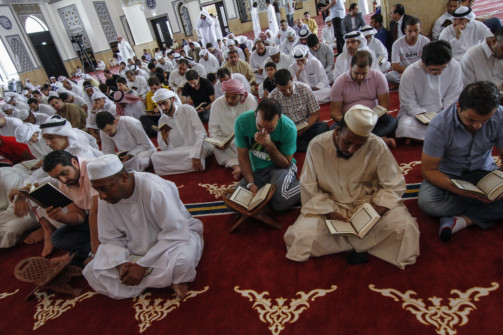
Sharjah: Starting Wednesday night, doors of 4750 mosques around the UAE will remain open round the clock to welcome people who wish to practise itikaf (seclusion), which means dedicating all their time to perform prayers and read Quran, an official at the General Authority of Islamic Affairs and Endowments, Sharjah Branch, said.
Iktiaf is what Prophet Mohammad (PBUH) used to do in the last 10 days of Ramadan.
Ahmad Ali Al Ali, Director of Corporate Communications at the General Authority of Islamic Affairs and Endowments, said that Sharjah’s 650 mosques would open their doors round the clock during the last 10 days of Ramadan for both men and women, each in their designated sections.
Management in mosques in other emirates would do the same, Gulf News learnt.
On a regular day, mosques close half an hour after each prayer is over and reopen for the next one.
The last 10 days of Ramadan are very important to Muslims, as they seek to observe Laylat Al Qadr (The Night of Power). Laylat Al Qadr is supposed to be the night when the Holy Quran was revealed to Prophet Mohammad (PBUH). The Quran states that Laylat Al Qadr is better than 1,000 months and that on this night angels descend on earth.
That is why Muslims devote more of their time to non-obligatory prayers, Duaa, Quran recital and any spiritual activity that makes them feel closer to Allah and some take up etikaf (seclusion) during those last 10 days, where they dedicate all their time to god.
Al Ali urged people to maintain the cleanliness of the mosque during these days as many tend to sleep and eat in the mosque during itikaf. “There are waste bins in every corner of every mosque and we urge people to use them to keep the mosque clean.”
He added that there is no problem with people getting their own food, as long as the food does not have a strong smell. “There are areas in the mosques dedicated for eating.”
Another issue, Al Ali explained, is that the cleaning companies do not have enough female staff to clean the women’s sections, and so male cleaners do the job. “As the mosques will be open all the time, the women doing itikaf might find it uncomfortable when the male cleaners come in to clean after Duhr prayers. So we ask the women to sit in one side and allow them to work.”
Mosques are sacred places that should be respected, Al Ali said.
He also asked people not to change the temperature the air conditioning is set at, and to fold and put away their blankets in the designated areas at least 15 minutes before the call to prayer.
“Some people have nice voices and volunteer to call for prayer, but we urge them to leave that to the assigned imam [prayer leader] of the mosque” Al Ali said. He asked that no one interfere in the proceedings of the prayer which includes the call to prayer and the leading of the prayer.
Some parents take their toddlers and young children with them to the mosque as there is no one to care for them at home. Al Ali said that that is permissible as long as the the children do not cause a disturbance or distraction. “There is no one to stop them from going in.”
A Gulf News reader had previously complained that when she went in with her two children someone stopped them. Al Ali said that it was probably one of the women going there for prayer.
While children can learn a lot about Islam and Islamic values when they go to the mosque with their parents, it is preferable to leave very young children at home as they tend to cause distractions, Al Ali said.
He added that in Islam it is said that it better for women to pray in their homes. Women receive the same blessing for praying at home that men receive for going to the mosque.










